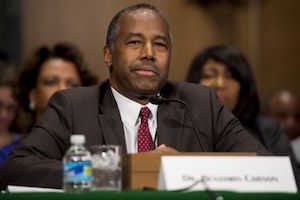
But the lay of the land looks different now than it did when Carson was first nominated and vetted by the Senate.
At the time, many observers tried to put a silver lining on Carson’s total lack of relevant experience by noting that the assistant secretaries could make a huge difference.
“Regardless of the chosen secretary of HUD, there will be much less to fear if assistant secretaries come with credentials like [Pam] Patenaude’s. Cameras may focus on hearings for secretary nominees, but all of us should focus on the next tier in each federal agency,” wrote Martin French in a comment on my first post about the HUD secretary nominations.
“If he surrounds himself with good people, [his lack of experience] becomes less important,” Laurie Goodman, co-director of the Housing Policy Finance Center at Washington’s Urban Institute, told The Real Deal. “You need the expertise within the agency.”
And HousingWire noted on Dec. 7, 2016, “As the country at large debates the readiness of former neurosurgeon Ben Carson to head the Department of Housing and Urban Development, housing insiders are closely watching nominations for the position that could prove even more pivotal at HUD—the deputy secretary.”
The short list for that nomination, revealed by HousingWire, which claimed it might “reassure” people worried about Carson’s credentials was (is?):
- Pam Patenaude of the Terwilliger Foundation for Housing America’s Families (which may explain why, after Patenaude was passed over for the top job, the Center issued such an insufferably gushy statement about the choice of Carson).
- Rick Lazio, a former Republican congressman who served as the deputy majority whip, assistant majority leader, and chair of the House Subcommittee on Housing and Community Opportunity, who was considered a moderate in his party. Though he once advocated for the repeal of the 1937 Housing Act, his positions on HUD funding in this 1997 Shelterforce interview look far more reasonable in today’s context than they did at the time (don’t tell 1997 that). He has also become more of an affordable housing advocate over time, leading the national housing finance practice group of Jones Walker LLP, and sitting on the board of the Terwilliger Foundation and Enterprise Community Partners.
- Brian Montgomery, who served as acting HUD secretary and assistant secretary for housing in the Obama administration, as well as numerous other extremely relevant government roles and on the board of NeighborWorks. One has to wonder if his inclusion on this list is a red herring (would this administration really accept someone with so much experience under President Obama?) and also why he would want to serve in this administration even if asked.
Again, that was the purported list as of Dec. 7, 2016. If that date seems like a long time ago, well, that’s because it is.
As of today, no nomination has yet been made for deputy secretary (Ron Sims was nominated as deputy secretary of HUD by President Obama on Feb. 2, 2009) or any of HUD’s assistant secretary positions.
In fact, as far as 2nd-tier leadership goes, the administration has so far nominated only two deputy secretaries plus a deputy attorney general and two associate attorneys general across the whole federal government.
Many people are finding this foot-dragging ominous, in light of the declarations of presidential adviser Stephen Bannon at the Conservative Political Action Conference (CPAC) declaring the administration to be “at war with the administrative state” and admitting that the cabinet leaders had been “selected for a reason, and that is deconstruction.”
As David Morris wrote in Fortune last week,
“The CPAC comments about ‘deconstruction’ are a toned-down version of startling statements made last August to The Daily Beast. Bannon impishly declared himself a ‘Leninist,’ saying that the Soviet leader ‘wanted to destroy the state, and that’s my goal too. I want to bring everything crashing down, and destroy all of today’s establishment.’
It’s not a stretch to see Bannon’s comments reflected not only in Trump’s cabinet picks, but in his slow progress in filling hundreds of lower-level cabinet positions. Until they’re filled, those positions are staffed by temporary administrators with reduced power, leaving enforcement and other matters in limbo.”
Cheerful. Unless, of course, the people who would end up filling those roles would not be from the list above, but instead cast in the mold of the cabinet-level appointees—picked expressly for their antipathy for that which they are supposed to be overseeing. In which case limbo might be preferable.
By the time HUD has a deputy secretary, crucial conversations about topics such as Dodd-Frank and fair housing enforcement and data collection will be well underway—not to mention broader questions about what kind of nation we want to be. We would do well to not wait to see who, if anyone, fills those leadership roles before joining those conversations ourselves.






Do not overlook that Trump’s goal is to dismantle by under staffing — and “other” means all Federal agencies — except an understaffed State and Commerce Department, Military, and Homeland Security. He is going to give a “gift” to States’ Rights by telling the States “Housing, Welfare, Health, and Schools are your jurisdiction;” and the governors are going to panic for money. —Herb Fisher